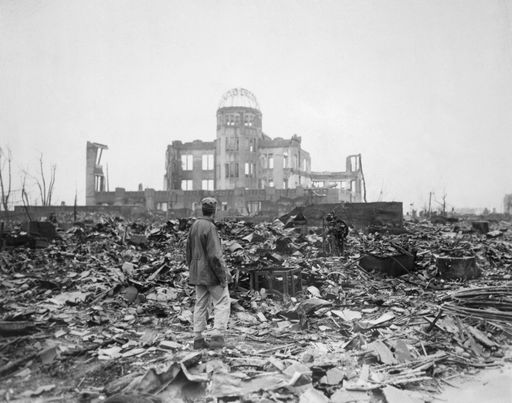When Israeli Prime Minister Benjamin Netanyahu claimed last week that invading Gaza was the only way to “end the war,” he joined a long list of war-mongering leaders who have framed devastating civilian losses as the price of peace.
From the US bombings of Hiroshima and Cambodia to the invasion of Iraq, the rhetoric is eerily familiar.
“It is a twisted morality,” says Na’eem Jeenah, senior researcher at the Mapungubwe Institute and Executive Director of the Afro–Middle East Centre, “where leaders try to portray themselves as seekers of peace, and their victims as being against peace even as terrorists or bloodthirsty actors.”
“Often, large sections of the public, especially in their own countries, believe them. Allies feign belief, and only when the public at home and abroad rejects the deception does the narrative start to crumble,” Jeenah tells TRT World.
Jeenah argues that this is exactly what’s happening with Israel’s genocide in Gaza.
“Very few people in the world, except those who uncritically support Israel, believe that it is fighting ‘terrorism’ or that its crimes began on October 7, 2023. Even Israel’s allies, whether they admit it or not, don’t believe the narrative.”
The ‘necessary evil’ throughout history
When it comes to the “necessary evil” narrative, it is the United States that finds itself making the so-called tough calls to “save lives.”
In August 1945, President Harry Truman authorised the dropping of atomic bombs on Hiroshima and Nagasaki, claiming the strikes would hasten the end of World War II and save hundreds of thousands of lives.
The bombs killed roughly a quarter of a million people, and left survivors scarred physically and psychologically for decades.
Many historians have since pointed out that Japan was already on the brink of capitulating, especially with Soviet forces entering the war, making the bombings far less about ending a war quickly and far more about projecting American power in the postwar world.
Jeenah notes that this choice also reflected a racial hierarchy in wartime decision-making.
“The main enemy of the Allies was Nazi Germany, yet the bombs were not dropped in Europe; they were dropped on Japan, accompanied by a plethora of racist tropes. Japanese bodies could be experimented on with new weapons because they were not valued equally to White bodies.”
Less than two decades later, President Richard Nixon and his National Security Advisor Henry Kissinger ordered secret carpet-bombing campaigns in Cambodia, sold as a way to “shorten the war” in Vietnam. Instead, the attacks destabilised Cambodia, killed tens of thousands of civilians, and contributed to the conditions that enabled the Khmer Rouge genocide.
The so-called act to hasten peace directly paved the way for one of the most notorious atrocities of the 20th century.
Similarly, in 2003, the US launched its invasion of Iraq under the banner of eliminating weapons of mass destruction and liberating Iraqis from Saddam Hussein’s dictatorship.
No such weapons were ever found. Instead, the war toppled a regime only to unleash years of chaos, sectarian violence, and mass displacement.
The world witnessed the horrors of Abu Ghraib prison, where leaked photographs revealed US soldiers torturing and humiliating detainees, a grotesque symbol of a war sold as a moral imperative.
Netanyahu’s Gaza comments sit squarely in this tradition: frame extreme military action as reluctant but unavoidable, present it as the last obstacle before peace, and recast the civilians caught in the middle as either tragic collateral or complicit enemies.
According to Jeenah, this is part of a broader “narrative war”.
“In Palestine, the Israeli government has, for decades, used the bogey of the masked Palestinian militant - whether PLO, Fatah, PFLP, Hamas or any other variety - who will murder, rape and pillage.”
“Even when that narrative does not come true, they create a web of lies to make it seem so, as we saw in the aftermath of the October 7 operation by the resistance in Gaza,” Jeenah explains.
No justification under international law
International law prohibits deliberate attacks on civilians and demands the protection of humanitarian workers and noncombatants.
The defence that atrocities are committed “to end the war” carries no legal weight whatsoever.
“This is particularly so under the Geneva Conventions (1949) and their additional protocols. Such acts remain prosecutable - before the ICC, ad hoc tribunals, or national courts under universal jurisdiction,” says Jeenah.
“Any claim that a military action is intended to shorten the war, must be weighed against the principles of distinction and proportionality. Deliberate targeting of civilians, torture, or other war crimes cannot be justified by claims of 'necessity'.”
The principles of distinction and proportionality in the laws of armed conflict require that harm to civilians be minimised and never used as a means to an end. Yet, as Jeenah points out, Israel acts with impunity, knowing it will be protected by Western states even from international courts.

Manufacturing consent for violence
To make atrocities palatable, leaders invest heavily in shaping the story. Phrases like “surgical strikes,” “collateral damage,” or “necessary sacrifices” sanitise violence.
When the rhetoric sticks, even decades later, many Americans still defend the bombings of Hiroshima and Nagasaki as necessary. In 1945, approval stood at a staggering 85 percent.
By 2015, that had fallen to 46 percent, and by 2024, over a third of Americans said the attacks should never have happened.
Another key tactic is fear-mongering, according to Jeenah.
“After 9/11, the US built a fear complex that led Americans to accept not only undermining the rights of others abroad but also their own freedoms at home; let alone those of Afghans, Pakistanis, or Arabs, whose countries became the playgrounds for US military action.”
This fear is often reinforced by a sense of supremacy.
“Whether it’s Americans believing they are exceptional, Whites believing they are superior, or Israeli Jews believing they are God’s chosen people, the underlying logic is the same: the well-being of the ‘superior’ group outweighs the lives of the ‘inferior’ group,” Jeenah adds.




















